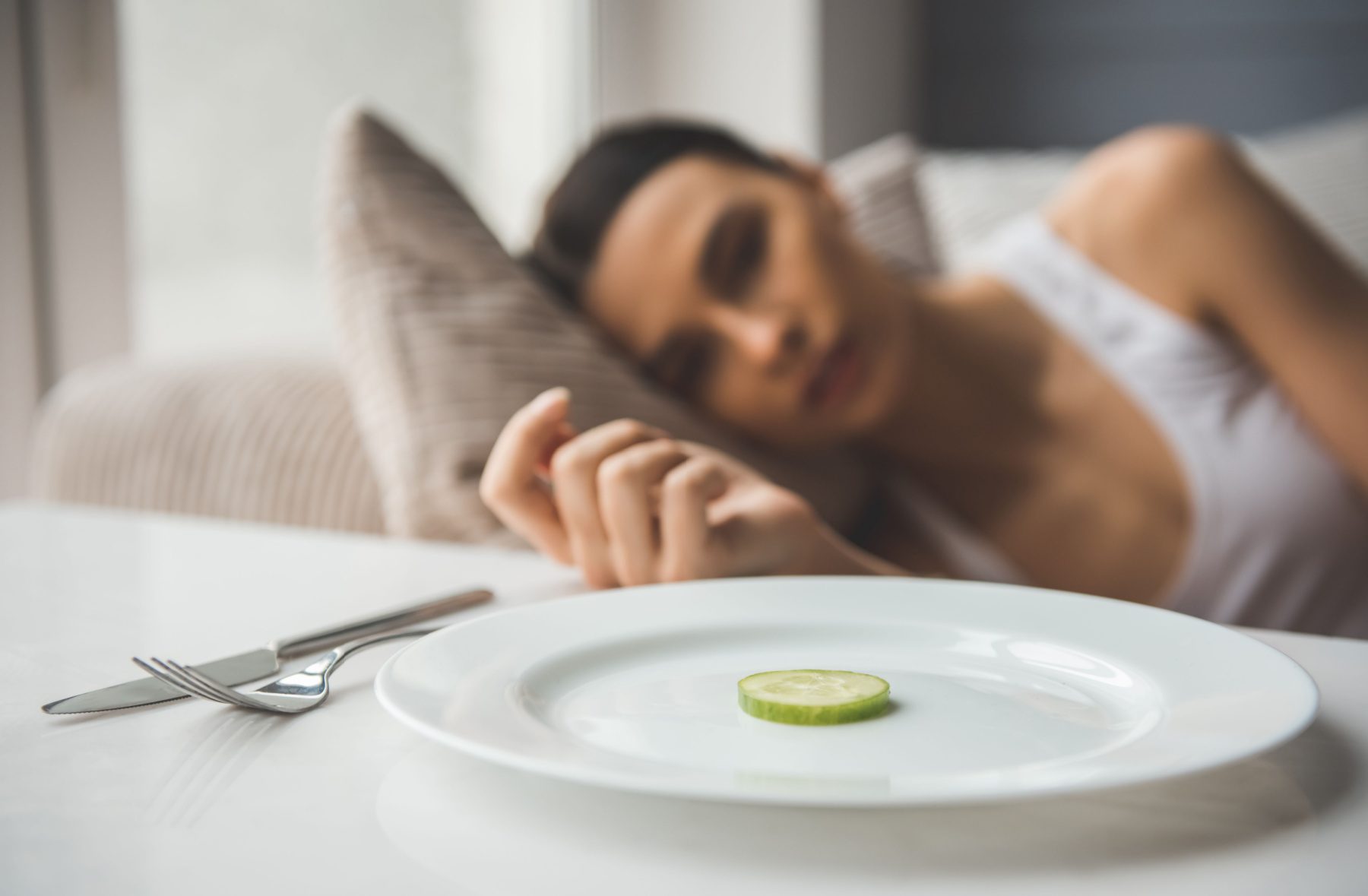Sugar cravings can be overwhelming, irresistible, all consuming. Sometimes they appear out of nowhere, while for other people they hit at a certain time of day, every day. If the cravings are intense, they can lead to overeating or bingeing on sugary foods, as a result of feeling out of control around the foods you’ve been so desperately craving. But understanding the root of these cravings is the key to overcoming them, to resisting the urge to throw all your hard work away and overindulge on foods that aren’t supporting your health goals. So here’s why you’re experiencing sugar cravings, and how you can learn to resist these intense urges.

Table of Contents
You’re not fuelling your body adequately.
Whether you’re not eating enough throughout the day, or your diet is lacking in key macronutrients, vitamins or minerals, each of these factors can lead to sugar cravings.
While some health professionals believe cravings are your body’s way of communicating it’s lacking in a certain nutrient, others think they’re a more psychologically-based phenomenon, and actually a way for your brain to tell you what it wants – whether it’s intending to satisfy an emotional or physical desire.
Regardless, eating inadequate energy throughout the day is the most common cause of cravings, particularly those occurring later in the day such as the “3pm slump” or post-dinner sugar cravings. If you’re not getting enough energy in your daily diet, your body attempts to compensate by encouraging you to eat highly-palatable, energy-dense foods, such as high-sugar or high-fat options. Your sugar cravings may well be a message from your body that it’s not getting the fuel it needs to sustain your energy output, and in a bid to change this and to receive the energy it needs, your body triggers cravings you find difficult to resist.
Similarly, if your diet is imbalanced, you may find yourself experiencing sugar cravings. For example, if you’re eating too much of one macronutrient (protein, carbohydrate or fat) and not enough of another, you might find yourself experiencing cravings. Insufficient protein, fibre and carbohydrate intake have all been linked to increased sugar cravings in various studies. Again, these cravings are a signal from your body that it’s not being fuelled in the way it needs to support optimal function.
Deficiencies in particular nutrients and minerals, such as magnesium and chromium, have also been linked to increased sugar cravings. Magnesium is strongly linked to chocolate cravings, in particular. Given that magnesium is lacking in Australian soil, many Australian adults aren’t meeting their recommended daily intake through diet alone, which could be a contributing factor to sugar cravings. Dietary guidelines suggest adult women need 320 mg per day, while adult men require 420 mg daily, so if your diet isn’t providing you with this, then you might want to consider supplementation under the guidance of a health professional.
The key takeaway is, if your diet is not providing your body with the energy or nutrients it needs to support your daily function, it may well trigger sugar cravings to compensate, driving a physiological desire in you to consume high-sugar foods to make up for whatever it’s lacking.

You’re not sleeping enough.
If you’re not getting enough sleep, or your sleep quality is poor, you’re likely to experience increased sugar cravings, as well as reduced control around food choices and eating behaviours. When you’re tired, your body looks for ways to quickly boost its energy levels to overcome the feelings of fatigue and exhaustion. Naturally, the quickest way to increase energy is to trigger cravings for high-sugar or high-fat foods, which provide an immediate burst of energy when you consume them. However, this sharp peak in energy is quickly followed by a crash in your energy levels, often leaving you more tired than you were before.
Another sleep-related contributor is the fact that, when you’re running on inadequate sleep, you’re less able to make healthy choices around food. So while you may normally opt for a nutrient-dense, balanced salad or stir-fry for lunch, when you’re sleep deprived you might succumb to the fatty burger and fries instead, followed by a large chocolate mousse for dessert, simply because the urge becomes more difficult to resist when you’re tired.
Tiredness also reduces your production of leptin, a hormone responsible for suppressing your appetite once you’ve eaten enough. So you’re more likely to overeat – particularly sugary foods – when you’re tired, for a variety of reasons.

You’re stressed.
Stress wreaks havoc on your body, emotionally and physically, and can drive a range of physiological processes causing you to crave sugary foods. When you’re stressed, your body increases its production of the hormone cortisol, which increases your desire for sugary, sweet foods. When you produce high levels of cortisol, your body perceives that it’s under threat, so it turns to foods which can provide a quick supply of fuel to fight against whatever may be causing the threat or stress; namely high-sugar foods like chocolate, cakes and biscuits, and other processed and refined options.
At the same time, you’re producing more ghrelin, the hormone responsible for controlling appetite, meaning you’re likely to feel hungrier and more vulnerable to intense cravings for palatable, high-sugar foods.
This combination of hormone production triggered by stress means your cravings will be more intense and difficult to resist than normal.

You’re emotionally eating.
Sometimes, cravings are your brain’s way of quieting or avoiding certain emotions or experiences occurring for you in the moment. For example, if you’re feeling bored or lonely or isolated, you might find you tend to head towards the pantry in search of something sweet to make you feel better. It’s a quick, reliable way of silencing whatever is actually causing you discomfort and unease, using food as a band-aid solution. And it’s incredibly common, yet a source of significant shame for so many people.
You might find you’re particularly vulnerable to emotional eating if you have or have ever had a strained relationship with food. If you impose food rules on yourself, for example limiting your consumption of sugary foods to weekends only, or attempting to give up sugar completely, you’re actually more likely to experience heightened cravings as a result. This is because, when you forbid a food, you almost elevate it to this “untouchable” status, meaning you’ll spend more time thinking about and obsessing over it, until you eventually give in to the overwhelming cravings for that food. This also makes you more likely to binge or overeat the sugary foods when you do cave, due to the mentality that you’ve “fallen off the bandwagon” so you may as well let yourself go completely. Or, for some people it’s the reverse: they’ve allowed themselves to eat the “forbidden food” this once, but they know they won’t be consuming it again in the near future, so they feel the need to eat as much of it as possible in the short window of time they’re “allowing” themselves to eat it.
In essence, this is why so many diets fail. The more food rules or restrictions you place on yourself, the more you tend to obsess over and crave these “bad” or “forbidden” foods, until eventually you’re unable to resist them. However, if you flip the script and instead allow yourself to eat all foods whenever you’re craving them, they suddenly lose some of their appeal or “specialness”, meaning it’s less of a big deal when you do eat them, so you’re unlikely to binge or overeat these high-sugar options like you otherwise might. Giving into cravings isn’t a sign that you lack willpower, it’s actually a side effect of restriction for many people, and nothing to be ashamed of. Work on removing your rules around food, and finding other strategies to work through and identify any emotions that show up and cause you to crave sugar, in order to be better able to resist or manage the intensity of your cravings.

It’s habitual.
If you’re in the habit of eating something sugary after lunch and dinner every day, your body becomes conditioned to crave these high-sugar foods over time. This behaviour comes to feel like a reward if it’s repeated for a period of time, further influencing you to crave these foods on an emotional and physical level, even if you don’t necessarily feel like them in the moment. In short, because you’re used to eating them at a certain time or occasion every day, you stop pausing to question whether you truly want them, and simply indulge in the cravings time and time again out of habit.
This is particularly the case with high-sugar, processed foods, as studies have shown these foods trigger the release of dopamine, a “feel good” neurotransmitter which activates your brain’s reward centre. Naturally, if a food makes you feel rewarded or happy after eating it, your drive to consume it will continue to increase further, adding to the intensity of your cravings.
Interestingly, while artificial sweeteners have been used to satisfy sugar cravings without the energy content of regular sugars, they’ve been shown to potentially increase sugar cravings in some people over time. This is because, being even sweeter than regular table sugar, they change your taste preferences over time, so things that once seemed sweet no longer do so. Once you adapt to the extreme sweetness of these artificial sweeteners, your drive for sweet, sugary foods can increase even further, again showing the potential for habits to drive sugar cravings.
So consider how you can change your sweets habit, and instead of indulging in a sugary dessert after every meal, or reaching for a chocolate bar each time the 3pm slump hits, why not switch it out for some sweet-tasting fruit, or a high-protein snack, which will curb the cravings and provide you with the energy and fuel your body is actually looking for? Once you rewire the habits you’ve formed, you can better listen to your body to identify when you actually want a sugary food, and when you’re simply eating one out of habit.

How can you manage your sugar cravings?
Here are a few useful strategies for overcoming or managing sugar cravings, over time and in the moment.
- Avoid restricting certain foods – even sugary ones. Instead of banning all sugar from your diet, allow yourself to include small portions regularly, to avoid the “all-or-nothing” elevated mentality around these foods. By including them regularly in small amounts, you’ll feel more in control when you do eat them, and you’ll be less likely to go overboard and binge on these foods. Everything is okay in moderation!
- Take a walk when the cravings hit. If you’re struggling to overcome habitual cravings, take a short 15-minute walk outside when you feel the urge rising. Studies show this is enough to overcome the cravings and redirect your thoughts and energy, if the cravings aren’t caused by a genuine hunger for sugary foods, or a deficiency in energy or nutrients.
- Opt for something sweet, minus the sugar. Foods like fruit, or even dark chocolate, can satisfy your sugar cravings without containing excess amounts of refined sugars, so give these a go instead of your usual milk chocolate bar and notice if the cravings subside.
- Develop a toolkit of strategies to turn to when you’re experiencing difficult emotions, like sadness or loneliness, so you have alternatives to emotionally eating sugary foods. Things like journaling, meditation, talking to a friend or loved one, or taking a walk in nature can provide the same respite you’ve previously looked to sugary foods for.
- Get enough sleep. Prioritise high-quality sleep, for 7-9 hours every night without fail, and you’ll notice your cravings become more manageable, and you have more control around food choices and behaviours as a result.
- Ensure you’re eating enough throughout the day, and including a balanced diet rich in all the key macronutrients, and satisfying your vitamin and mineral requirements too. Don’t neglect carbs, fats or proteins – they’re all incredibly important! Try including more regular, balanced snacks if it helps you meet your energy and nutrient requirements more easily.
- Stay hydrated. Sometimes we perceive dehydration to be intense hunger or cravings, so by staying hydrated throughout the day you’ll be less susceptible to this mistake.
Give these tips a try, and see if your sugar cravings become more manageable – or even vanish altogether! Awareness of whatever factors are driving your cravings is the key to overcoming them, and learning to practise portion control when you do indulge in a sweet treat.

